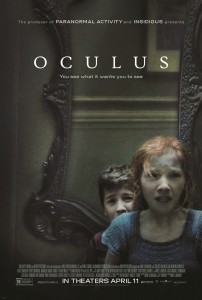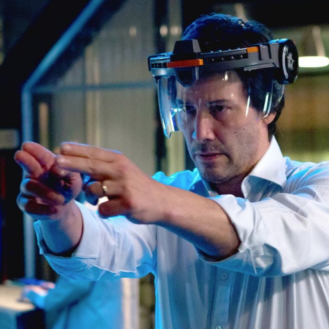Mike Flanagan’s off-shoot elaboration of his short film Oculus: Chapter 3 – The Man with the Plan turns into a movie where things happen. Things that aren’t really interesting or thrilling. Just a lot of stuff that may or may not be real. This is because Oculus is a horror film with no tension.
Oculus is a movie that makes me appreciate Book of Shadows: Blair Witch 2. It’s a sequel that unfairly gets frowned upon and shoved aside too easily. Book of Shadows was about a group of hardcore fans of The Blair Witch Project who then ventured into the woods to get a taste of the spookiness. Slowly, the woods become a puzzle and the troupe turns cuckoo on each other.
It’s a film that plays with the mind and proposes that a supernatural force can alter your perspective of reality without you knowing it. Book of Shadows problematically runs its sense of paranoia into the ground, but if you go for the ride, you believe that an embroiling evil exists in the story.
Oculus takes similar scary subject matter and works it in reverse. Flanagan lays all his cards on the table, and starts giving away too much too soon.
Two siblings, Tim and Kaylie Russell (played by Brenton Thwaites and Karen Gillan), have an eerie possession from their past. An ominous and jagged mirror hangs from the wall of their original homestead. Kaylie believes a supernatural force is alive within the confines of the piece. An evil that tore their family apart.
There’s a bit of hesitation on Tim’s part, as he tries to jog his sister’s memory about unstable family matters. Kaylie won’t budge on her theories though.
Gillan reads pages and pages of background exposition about this sinister mirror, hoping that Tim will be convinced and that the audience will be shaking in their boots. That approach doesn’t work as well as screenwriters Flanagan and Jeff Howard think. Kaylie’s case rambles on as each story takes on a repetitive, pedestrian form with gruesome – sometimes poorly photoshopped – photographs. Someone inherits the mirror, crazy stuff happens, someone winds up dead, and then it’s passed on to someone else.
The repetition continues in the pesky bickering between Thwaites and Gillan. As Kaylie’s opinion gets to be more believable, the intrigue sours and movie goers start to get a sense of where this story is headed.
Eagerly, Oculus’ screenplay flat-out tells you that Kaylie is on to something. The mirror plays mind games just as the witch did in Book of Shadows, and the siblings start to go looney as they question everything.
Flanagan also snaps back and forth between present day and the past, and sometimes blends both time periods together. The crafty timing and nice edits make these transitions seamless, even though the act of merging two periods together doesn’t quite add up to much.
Because everything starts to become obvious that a mysterious force is controlling everything, nothing is believable or secretly devious. The audience starts predicting scares and mirages since the film has bluntly stated that practically everything is false, impairing our willingness to go with it.
There are a few moments of squirm worthy material that certainly earns the film its R-rating, but there’s ultimately no threat because the audience is taking each step with a grain of salt.
No matter how unsettling the Newton Brothers’ score becomes, we never feel invested in the story because of how little there is to care about anything going on. Like I said, it’s a film that has a lot of stuff happening. But no matter how much stuff happens, we wish Flanagan would’ve let the anticipation simmer a bit longer.





Be the first to comment